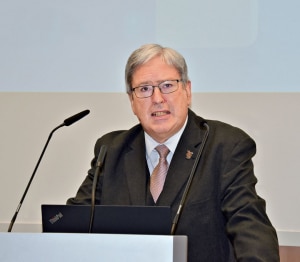
Among all German states, Brandenburg has had the most trouble striking the right balance between its fossil and renewable sources of energy. Many jobs in the south of state depend on lignite mining, while large wind farms have been put up in the north and around Berlin. The state government, a coalition of The Left and the SPD, has been trying for years to find an equitable solution to its very own energy dilemma.
H2-international spoke to Brandenburg’s minister for economy and energy, Jörg Steinbach, of the Social Democrats, about the possibility of using hydrogen to combine both pathways.
H2-international: Mister Steinbach, last September, you became Brandenburg’s economy minister, even though you used to work as a scientist and were the president of the TU Berlin university, as well as a founding member of the Brandenburgisch Technische Universität Cottbus-Senftenberg. Why go into politics?
Steinbach: Unfortunately, I’ve observed for some time that our society, which was shaped by 60 years of being a representative democracy and helped transform Europe into a beacon of peace, is now at risk of succumbing to nationalism and populism. Politicians themselves are partly to blame for that. When you’re offered a chance to fight those tendencies by taking on responsibility and showing others that you can turn the ship around, you just have to say yes, speak up and take a stand.
A crucial date in recent times, I’m guessing, was the day the coal commission published its final report. What do you think of its findings?
I recently heard a journalist say that only a painful compromise is a good compromise. I agree. The commission did the best it could, considering the circumstances. It was a relief for me to see most of its members come out in support of its suggestions to exit coal power production while attempting to retain the economic prowess of German lignite mining areas. After all, the vote on the final version of the report was near-unanimous. What is important at this point is that we use the commission’s recommendations to start establishing a reliable set of rules as soon as possible.
How will you ease the fears of coal miners, who are worried about their futures and justifiably so?
Their worries will become calculable risks once we pass our legislative package. It will allow them to respond to the transformation of the sector by planning ahead. While that will, no doubt, be a painful experience, I believe the uncertainty in past years has been worse. We will not leave the miners behind. Instead, we can and will use the funding available to us to attract new manufacturing jobs and ensure the successful transformation of local economies. I sincerely believe that twenty years from now, the Lausitz region will be even more appealing than it is today.
There is no longer any dispute about whether climate change is real. It is. What we need to do now is to reduce carbon and GHG emissions to prevent irreversible damage to our environment
Jörg Steinbach
How will you create those opportunities? Which areas do you believe have potential to shape the future?
…
read more in H2-international April 2019

























0 Comments
Trackbacks/Pingbacks